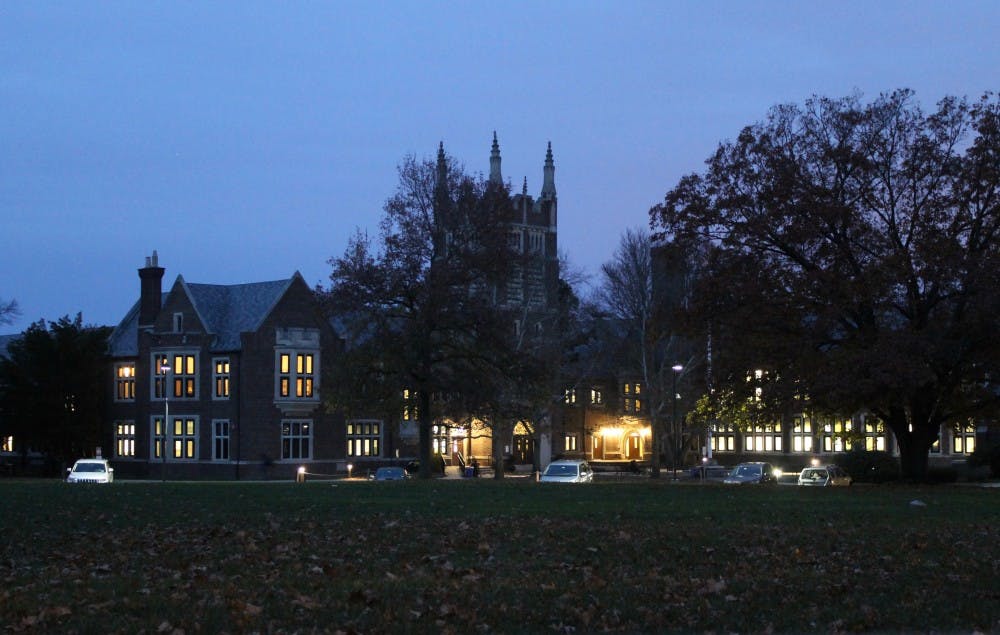On Dec. 11, residents of Princeton will vote in a special election on a proposal to provide the town’s public schools with a $26.9 million bond for facilities upgrades.
Funds from the bond would be used for security improvements, capacity increases, and heating, ventilation, and air conditioning (HVAC) upgrades at all schools in the district. In addition, nearly $11 million in upgrades would be provided for Princeton High School (PHS), creating four additional classrooms, a dining distribution center on the main floor, a larger gym, and improvements in the student counseling area.
The proposal comes at a time when all of Princeton Public Schools are at or over capacity. Enrollment in the district has grown to 3,765, a 10 percent increase since 2013, and conservative estimates predict a further increase of 10 percent in enrollment by 2022 with an additional increase of 8–10 percent by 2027.
PHS, with 1,652 students, and John Witherspoon Middle School, with 753 students, have no more classroom space, while the elementary schools are projected to be over capacity in the near future.
In addition to new classrooms, security upgrades, and HVAC installation, architects suggested creating a new school for fifth and sixth graders, which would take out fifth graders from elementary school and sixth graders from middle school, helping with overcapacity issues.
According to Patrick Sullivan, the president of the Board of Education, the referendum vote was proposed by the board after months of meetings and discussions with town residents. The board also consulted parent-teacher groups, taxpayer committees, and architectural firms.
Without any major referenda concerning Princeton public schools in the past 20 years, a series of issues had accumulated, according to Sullivan.
The result is an ambitious and expensive plan with an estimated total of $160 million for upgrades in the district. This was eventually worked down to $130 million.

“With the Trump tax plan having taken away state deductions, it’s a hard time to talk about tax increases [with Princeton residents] at this time,” Sullivan said. “Some people felt like it would be too big of a bite to do it all at once.”
The board eventually decided to break the proposal down into more manageable stages. The first step, up for a vote next month, only involves upgrades considered critical by the school board: basic improvements to HVAC, security, capacity, and general building maintenance, which would all be carried out over the next summer break.
If the referendum passes, the board hopes to go back to the community in early 2019 to discuss further changes and reach a broader consensus.
In an effort to give residents a chance to see the current state of the high school, Susan Kanter, a parent of current and former students, has been hosting guided tours of the facilities. She points out important areas of the school that would be affected by the changes, including the entrance, where a double door system would be installed for increased security, as well as the gym, cafeteria, and counseling area.

“Most of the people voting on the referendum have likely not seen the high school in a long time, so this is a good chance for them to see what they’re voting for,” Kanter said.
PHS alumni reactions to the referendum have been positive. The students interviewed said that the proposal seeks to solve issues that they’ve encountered themselves.
Fergus Binnie ’21, a PHS alumnus, expressed hope that this referendum would address issues with the counseling department. According to Binnie, the department is underfunded and inefficient. He claimed to have had problems seeking help for himself and for fellow students, despite the staff’s best efforts.
Binnie claims that this can be attributed to a number of structural issues in the department that could be addressed with additional funding.
“It [the counseling department] fails at its mission to keep students mentally safe,” Binnie said. “It does have a good mechanism once it kicks in, but it often fails to kick in, proving incompetent and inefficient.”
Simon Rosen ’22, also a PHS alumnus, said that he hopes that upgrades to the cafeteria improve the current situation, where all PHS students have lunch at the same time, forcing a large number of them to eat in the hallways, on the floor, or in the library.
“It’s just not a great experience,” said Rosen.
According to Amy Wang ’22, a PHS alumna and former student liaison to the PHS administration, the upgrades proposed by the referendum show that the board is responding to student demands. Surveys conducted last year showed that students prioritized HVAC installation and upgraded classroom capacity, among other improvements included in the proposal.








